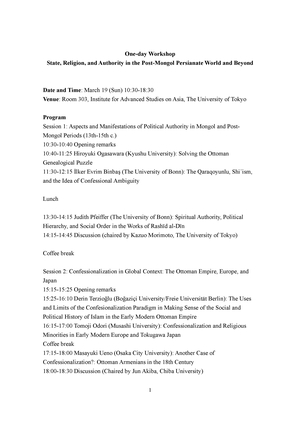News
東文研ワークショップ「ポスト・モンゴル期の国家、宗教、権威 / State, Religion, and Authority in the Post-Mongol Persianate World and Beyond」が開催されました
報告
3月19日(日)、ワークショップ State, Religion, and Authority in the Post-Mongol Persianate World and Beyond が開催されました。
第一セッション Aspects and Manifestations of Political Authority in Mongol and Post-Mongol Periods (13th-15th c.) では、アッバース朝カリフの権威の消滅、モンゴル的要素の付加、それらと深く関係するいわゆる「宗派的曖昧性」などの諸要素によりきわめて複雑な様相を呈した、当該時代の政治的権威とその表象の諸相が議論されました。
続く第二セッション Confessionalization in Global Context: The Ottoman Empire, Europe, and Japan では、ヨーロッパ史の文脈をこえ、世界史的な視点から「近世」を考察する際に有用な概念として注目されている「宗派化」をキーワードに、オスマン帝国、スイスを中心とするドイツ語圏のヨーロッパ、日本の事例が取り上げられ、議論されました。第一セッションにおける討論においては、具体的な事例を扱う3発表を踏まえて、「宗派的曖昧性」という概念でモンゴル時代と近世以前のポスト・モンゴル時代を特徴づけることが、その時代に生きていた人々にとって、状況は「複雑」ではあったかもしれないが「曖昧」ではなかったのではないかという認識を妨げ、そうした複雑な状況自体の解明を妨げることになっているのではないかという疑義が提出され、議論されました。第二セッションにおいてもまた、「宗派化」という概念を、近世を特徴づける、特定の史的文脈を把握するための概念としてではなく、歴史のさまざまな局面で生じてきた、宗教的な基盤による社会結合の強化という現象を広く捉える分析概念として用いることの可能性やそうすることの意義などが議論の俎上に上がりました。
個々の事例発表に関する議論を超え、より上位の分析概念についても議論を進めることができた有益なワークショップとなったと感じています。
なお、本ワークショップは、東洋文化研究所、科研費プロジェクト「イスラーム国家の王権と正統性」(代表:近藤信彰;15H01895)、同「17〜19世紀オスマン帝国における近代社会の形成」(代表:秋葉淳;26284106)、ペルシア語文化圏研究協会日本事務所との共催で開催しました。
(文責:森本一夫)
当日の様子
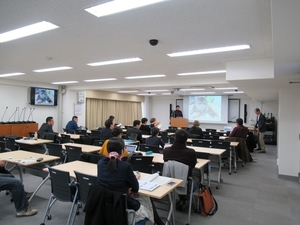 | 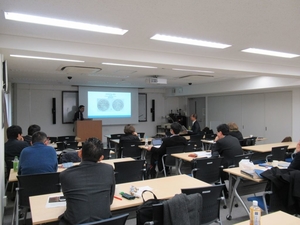 |
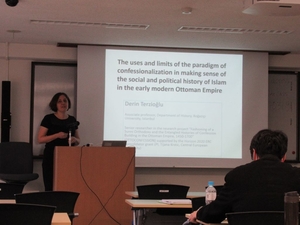 | 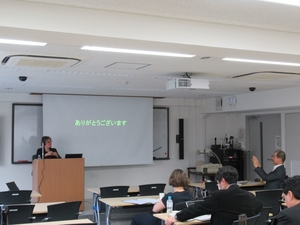 |
開催情報
Date and Time:
March 19 (Sun) 10:30-18:30
Venue:
Room 303, Institute for Advanced Studies on Asia, The University of Tokyo
Program:
| Session 1: Aspects and Manifestations of Political Authority in Mongol and Post-Mongol Periods (13th-15th c.) | |
| 10:30-10:40 | Opening remarks |
| 10:40-11:25 | Hiroyuki Ogasawara (Kyushu University): Solving the Ottoman Genealogical Puzzle |
| 11:30-12:15 | İlker Evrim Binbaş (The University of Bonn): The Qaraqoyunlu, Shiʿism, and the Idea of Confessional Ambiguity |
| Lunch | |
| 13:30-14:15 | Judith Pfeiffer (The University of Bonn): Spiritual Authority, Political Hierarchy, and Social Order in the Works of Rashīd al-Dīn |
| 14:15-14:45 | Discussion (chaired by Kazuo Morimoto, The University of Tokyo) |
| Coffee break | |
| Session 2: Confessionalization in Global Context: The Ottoman Empire, Europe, and Japan | |
| 15:15-15:25 | Opening remarks |
| 15:25-16:10 | Derin Terzioğlu (Boğaziçi University/Freie Universität Berlin): The Uses and Limits of the Confesionalization Paradigm in Making Sense of the Social and Political History of Islam in the Early Modern Ottoman Empire |
| 16:15-17:00 | Tomoji Odori (Musashi University): Confessionalization and Religious Minorities in Early Modern Europe and Tokugawa Japan Tomoji Odori (Musashi University): Confessionalization and Religious Minorities in Early Modern Europe and Tokugawa Japan |
| Coffee break | |
| 17:15-18:00 | Masayuki Ueno (Osaka City University): Another Case of Confessionalization?: Ottoman Armenians in the 18th Century |
| 18:00-18:30 | Discussion (Chaired by Jun Akiba, Chiba University) |
For abstracts, please visit HERE(PDF:140KB)
Contact Person:
Kazuo Morimoto (morikazu[at]ioc.u-tokyo.ac.jp)
The event is free of charge and open to the public. No registration required.
Co-sponsored by Institute for Advanced Studies on Asia (Tobunken Symposium); JSPS Kakenhi, “Kingship and Legitimacy of Islamic Dynasties: Focusing on the Early Modern Empires” (15H01895); JSPS Kakenhi, “Formation of Modern Society in the Ottoman Empire, 17th to 19th Centuries” (26284106); Japan Office, Association for the Study of Persianate Societies (Gilas Seminar).
Related Events:
March 21 (Tue): Half-day Workshop: Japonya’da Sohbet-i Osmaniye-3 (Faculty of Letters, Chiba University)
March 22 (Wed): Half-day Workshop: Aspects of Middle Eastern Societies in the Mongol and Post-Mongo Periods (provisional title) (Institute for Advanced Studies on Asia, UTokyo)
March 26 (Sun): Lecture Event: New Perspectives on the Study of the Post-Mongol Islamic World (School of Theology, Doshisha University)
登録種別:研究活動記録
登録日時:SunMar2613:58:502017
登録者 :森本・藤岡
掲載期間:20170319 - 20170619
当日期間:20170319 - 20170319

